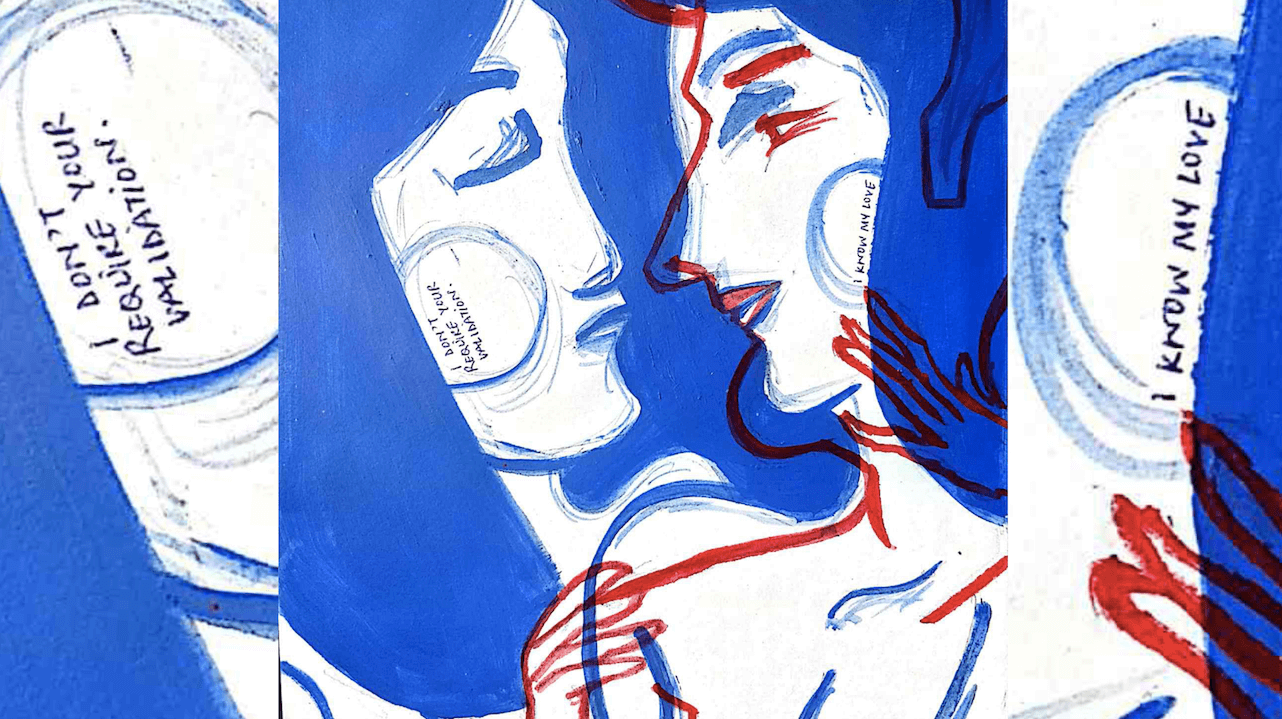Dating!
The politics ingrained in the word combined with our cultural experiences of being young, queer, Indian and living in the capital give us chills. For a queer person, dating can be disastrous, not just because of the traditions enforced upon us but also the lack of safety nets available to us. Bisexual women and transgender people are especially prone to intimate partner violence, while gay men and lesbians experience domestic violence almost in the same frequency as heterosexuals.
In addition, community members regularly face hate crimes, discrimination and harassment on the basis of their sexual orientation or gender identity. The experience is even more harrowing for queer people who belong to marginalized social groups who face additional oppressions. There is no law that especially protects the queer community from these acts of violence and this makes it difficult for us to date in peace.

Credit: Nazariya: A Grassroots LGBT-Straight
Alliance
As we grow up with access to only stereotypical, inaccurate portrayals of queer relationships in media that often end in tragedy, we begin to admire the larger than life tales fed to us by heteronormative pop media. We start romanticising unhealthy relationship patterns as they are so often normalised and portrayed as the ideal.
This leads us to possess unrealistic standards when it comes to dating as we navigate our relationships unguided, socialised by a society where roles are matched to assigned genders. These gender roles also influence our relationship power dynamics as we become adults. The fact that queer representation in the media largely revolves around hypersexual imagery and fetishisation also perpetuates the idea that sex is the ultimate goal of queer relationships – this makes dating difficult for those of us who aren’t particularly fond of this culture. While we are certainly not asserting that we are sex-negative, it has been exalted in the community (especially in gay circles) to a point where the culture indirectly forces us to be fixated on only hookups.
While queer nights in clubs and cafes like Kitty Su and Chez Jerome Q Cafe have made it easier to find company, they still lack safety measures and queer women have often experienced groping and unwanted advances in these spaces. These special nights are also usually focused on men – and the exclusion doesn’t stop there.
Within the community, there exists lots of subtle but very real discrimination on the basis of caste, class, race, skin colour, ‘queer tribe’ etc. Dating apps further reinforce these divides, with many profiles hiding their prejudices under the garb of ‘preferences’ which further alienates a lot of us. There have also been many frightening instances of straight people abusing these apps to exploit and expose queer folks and blackmailing them. Some also resort to using fake accounts to bully or catfish people.

Credit: Nazariya: A Grassroots LGBT-Straight
Alliance
The recent horrific incident of a Delhi college student who was killed by a man he met through a dating app was a grave reminder of the risks queer people take just to date. Similar cautionary tales of lived experiences exist within the community, though most remain unreported.
Acceptance is another deep-rooted issue, the lack of which has resulted in queer youth being pushed deep into the closet and engaging in unsafe sexual habits, putting them at a heightened health risk. Vidhi Legal Policy Centre released a report titled, The Law Isn’t Straight, which says that queer children are most vulnerable to oppression, but lack adequate protective rights. It also addresses the issue of gay men being at a higher risk of getting STIs like herpes, HIV and Hepatitis B and C.
In India, queer or not, we are all deprived of sex education and most of the time our parents completely refuse to acknowledge that sex even exists, forget talking to us about safe sexual practices – and this stigmatizes the use of protection.
Slowly, but hopefully, surely, the government seems to be moving towards a decisive direction regarding section 377 and its negation. It is unclear whether progress is being made on the societal front as ministers, politicians, and religious leaders keep making ridiculous ill-informed, bigoted statements regarding the community.
While our goal is to change the misconceptions regarding the community, we cannot disregard the need to check ourselves constantly and change our culture especially when it comes to dating. Dating can be fun and exciting but in queer circles, it is a privilege that not everyone can afford. It is usually the financially and physically independent, well-off folks with good support systems who get to enjoy the luxury of safely dating. Marginalized queer folks fear violence from their family and society and face discrimination from within the community as well. But even for well-off off folks, safety is still not ensured. We can change the culture by making our queer events more accessible and interactive, by checking our privileges and not continuing the social divisions within the community. Additionally, desexualizing ourselves from the hypersexuality forced upon us largely by a heteronormative society will help. We also need structural change by demanding that the state recognize the rights of its queer citizens, and protect one of its vulnerable communities.
The authors are all contributing as a team from ‘Nazariya: A Grassroots LGBT-Straight Alliance’

